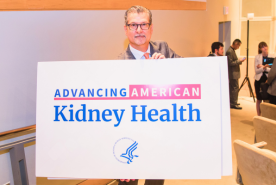March 28, 2023
Continuing education series for professionals.
Major depressive disorder is four times more common in people undergoing long-term dialysis than in the general population. As a result, patients are more likely to have greater non-adherence, poorer quality of life, and higher mortality. The ASCEND study, funded by the Patient-Centered Outcome Research Institute, PCORI, hopes to change this by testing two possible options for treatment.
What is PCORI research?
"PCORI is an independent non-profit research organization whose primary focus is to fund research designed to empower patients to make better healthcare choices," said Dr. Daniel Sugar, clinical health psychologist and Director of Behavioral Health. "Their primary mechanism of intervention is funding Clinical Effectiveness Research, or CER."
CER generally compares two types of medical treatments or services to help healthcare providers and patients make better-informed decisions about their care.
Find tools and resources to support engagement with PCORI.
What is the ASCEND study?
This study tested two interventions for depression in 120 people receiving long-term hemodialysis; cognitive behavioral therapy (CBT) versus sertraline, a selective serotonin reuptake inhibitor.
"ASCEND is a parallel group randomized controlled trial. This means we tested two interventions to find the most effective treatments for depression in people on long-term hemodialysis," said Dr. Sugar. "Our primary outcome measure was the Quick Inventory of Depressive Symptomatology (Clinician Rated) (QIDS-C), a clinician-assessed instrument considered the gold standard, objective measure of depression. All patients took this questionnaire before, during, and after their interventions."
The first half underwent 10 CBT sessions from a trained therapist over 12 weeks during their dialysis sessions.
"Those receiving CBT got very specific in terms of setting goals around diet, exercise, and medication adherence. We talked about re-engaging with enjoyable and physical activities," said Carlin Clark, behavioral health interventionist and social worker. "Then we talked about strategies for dealing with anxiety, physical relaxation techniques, and deep breathing. Toward the end of these sessions, we talked about moving forward. What will be their action plan to stay on track? We also provided facilitation with their primary care providers for ongoing care."
The other half took sertraline, which they were able to refill at their dialysis centers as opposed to going to a pharmacist.
"The 12-week period favored sertraline, but the slight difference was not clinically meaningful. We defined success as a greater than 50% reduction in depression scores, and neither intervention reflected a different quality of life or level of depression," Dr. Sugar said. "When looking at remission, where those treated were no longer depressed, there was a similar response in both groups, with a slight advantage for the sertraline group."
Those who received sertraline had slightly better depression scores but also had more mild to moderate adverse events, including a higher risk of bleeding.
Read the complete ASCEND study.
Interventions for depression
Practitioners must converse with patients and their caregivers to determine whether they have or need treatment for depression.
"Understanding where the patient is coming from and what their comfort level is with different types of interventions is crucial," said Clark. "Building that rapport by really engaging with patients helps increase their willingness to identify and work on concerning symptoms.”
To help support these conversations, clinicians may want to discuss the following:
- How symptoms of untreated depression can be similar to kidney failure.
- How treating depression may help improve quality of life.
- The benefits and trade-offs of talk therapy versus medication.
Clinicians may also want to provide the following:
- Opportunities for support, like NKF Peers.
- The Dialysis Patient Depression Toolkit by the National Forum of ESRD Networks.
- The national hotline for Substance Abuse and Mental Health Services Administration (SAMHSA) at 1-800-662-HELP (4357).
Get access to more clinical tools and resources with an NKF Membership.
Earn CE On the Go
Listen and earn CE as our panelists delve into the subjects that matter most to you while offering in-depth clinical updates and real-world examples of these changes. Subscribe to The Kidney Commute Podcast.









